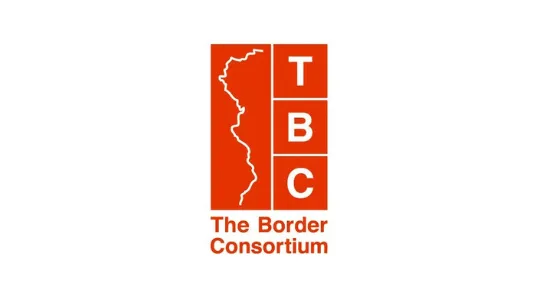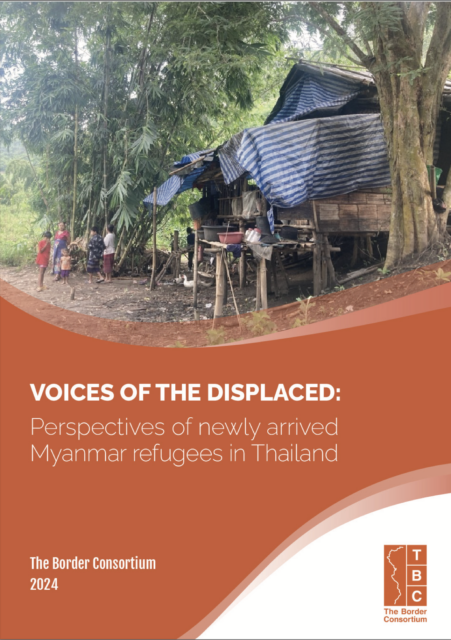Voices of the Displaced: Perspectives of Newly Arrived Myanmar Refugees in Thailand
22 May 2024


Since the coup on Feb 1st 2021, the Myanmar military has killed over 4,700 civilians, detained, and imprisoned over 26,000 human rights defenders and displaced at least 2.6 million people. Heavy fighting between the Myanmar military and Peoples Defense Force (PDF) and Ethnic Revolutionary Organisations (EROs) has seen a rapid deterioration in the humanitarian situation. In much of southeastern Myanmar, heavy artillery strikes and aerial bombardments have resulted in civilian casualties as well as destroyed schools, homes, hospitals, churches and temples. Compounding the situation is the collapse of the local economy with almost half of all Myanmar citizens now living in poverty. Many villages have not been able to plant rice, depriving them of their livelihood. Many of those able to grow rice and vegetables are unable to sell them, as the roads to market have been blocked.This action was taken by the Myanmar military to deprive anti-junta forces of the supplies needed
to continue fighting. Power outages remain pronounced, and the banking system is in a state of collapse. Healthcare is dire and schools have closed. There is no social security on offer. Many have sought refuge either in the jungle or in IDP camps in Myanmar, but over 20,000 others have sought refuge in Thailand.
Thailand has over 93,000 refugees living in nine refugee camps. Yet refugees arriving after the coup, in accordance with official Royal Thai Government policy, are disallowed official access to the existing camps, with many instead kept in tightly controlled “Temporary Safety Areas” (TSA). In many cases these are clearly inadequate as suitable living spaces for families and individuals. The restricted access to these areas has posedsignificant challenges in ensuring adequate protection and the provision of even the most basic of humanitarian aid. Many of the newly arrived individuals have been pressured into returning, fully aware that they will not be granted long-term refuge in Thailand
Knowing conditions in TSAs will be difficult and refuge will be temporary, many new arrivals have chosen to risk living in hiding from Thai authorities, in remote rural communities along the Thai Myanmar border.
TBC has been providing aid to these communities since the coup, however we are increasingly facing shortages in funding. Costs to provide emergency food and shelter are 7 million THB ($190,000USD) per month, approximately 90 million baht ($2,500,000USD) for a six-month period.
During the third quarter of 2023, TBC interviewed more than 35 households along a 700+km stretch of the Thai/Myanmar border. What follows inthis report is a snapshot of the challenges and struggles that thousands of families along the border face. This is a representative sample including young families, elderly communities, people with disability (PwD), Karen villagers from rural Myanmar and Burmese school teachers from urban areas. Their backgrounds and lived experiences vary radically, but they all share the same restricted horizons, and all their voices need to be heard.
Due to issues around access and protection there has been little to no coverage of refugee populations hiding in rural Thailand. As they are unreported, they are often lacking the support that other displaced populations have.
This report features an analysis of the humanitarian situation for these arrivals, a detailed qualitative thematic analysis of their lived experience and a selection of direct testimony of refugees, highlighting both their agency and their challenges.
The overwhelming majority of this population don’t have documentation and are effectively in hiding from Thai authorities. All identifying information of this population has been removed. We request you to be discreet and considered when engaging in advocacy around this population asthey are living with extreme protection concerns. Photographs of persons in this report have been included with the expressed consent of those depicted. However, images have been blurred to obviate identification and security concerns.
Announcements
04 April 2025
Myanmar: Human Rights Council condemns the junta, responds to the earthquake, and calls to end sale and supply of arms and jet fuel
31 March 2025
သတင်းထုတ်ပြန်ကြေညာချက် – မြန်မာနိုင်ငံရှိ ငလျင်ဒဏ်သင့် သက်ရှင်ကျန်ရစ်သူများနှင့် ထိခိုက်ခံစားရသည့် လူထုများအတွက် သဘာဝဘေးအန္တရာယ်ဆိုင်ရာ ကူညီကယ်ဆယ်ရေးအတွက် အရပ်ဘက်လူထုအဖွဲ့အစည်းများတောင်းဆို
30 March 2025
Press Statement: Civil society calls for disaster relief for earthquake survivors and affected communities in Myanmar
17 March 2025
အိတ်ဖွင့်ပေးစာ – အထူးကိုယ်စားလှယ်၏ အကျိုးစီးပွားဆိုင်ရာ ပဋိပက္ခရှိနေမှုက စုံစမ်းစစ်ဆေးမှုပြုလုပ်ရန် နှင့် ၎င်း၏လုပ်ပိုင်ခွင့်အာဏာကို အဆုံးသတ်ရန် အရေးတကြီးလိုအပ်နေမှုကို ဖော်ပြနေသည်
17 March 2025
Open letter: Special Envoy’s conflicts of interest signal urgent need for investigation and complete end of mandate

Progressive Voice is a participatory rights-based policy research and advocacy organization rooted in civil society, that maintains strong networks and relationships with grassroots organizations and community-based organizations throughout Myanmar. It acts as a bridge to the international community and international policymakers by amplifying voices from the ground, and advocating for a rights-based policy narrative.